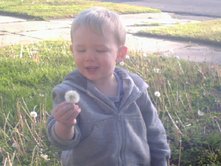
This is the sermon for Trinity Church of the Nazarene on December 28, 2008 using the book by Shane Claiborne, "Irresistible Revolution: Living as an Ordinary Radical," (published by Zondervan, 2006).
When I was growing up, there was a TV sitcom called “Family Matters.” Does anyone remember this show? It was part of “TGIF” on Friday nights and one of the only shows I was allowed to watch.
It was a show about the Winslow family and their annoying neighbor… Steve Urkel .
Steve had a high-pitched voice, snorted when he laughed, broke everything he touched, and always said the same line, “Did I do that?” Which of course, he did. He broke lamps, shattered windows, burned down buildings, and invented disasters.
Carl, the Winslow family’s father would scream out, “GO HOME STEVE” and Steve would respond, “I don’t have to take this, I’m going home.”
And although the Winslow family is completely annoyed with their crazy kid neighbor…Steve ends up becoming a member of the Winslow family.
They take Steve into that house they asked him to leave… when his parents go away (forever).
Steve was even quoted to have told Eddie and Laura, Carl Winslow’s kids, “I’d give anything to have a brother or sister… or parents who call.”
Steve is left orphaned.
And the Winslow family takes him in, in spite of how annoying, pathetic, aggravating, irritating, or infuriating he is.
And by the final seasons, when Steve is lost in outer space… he returns to the Winslow house to hear these words, “Welcome home Steve”
…“Go home,” to “Welcome Home.” That’s quite a shift.
Even annoying neighbors can become family.
Our passage of scripture today is about family, our family in Christ, from Galations 4:4-7.
That first phrase in verse four is best translated from the original Greek, “In the fullness of time” (NRSV). Because to translate it “in the fullness of time” captures the author’s intent to speak of an ongoing work of redemption; the ongoing work of God to redeem all of creation.
“In the fullness of time” captures God’s purpose to continue working on us, to continue creating us, to continue transforming us into who we were meant to be.
If we read this verse, “In the fullness of time God sent a Son,” we understand in the fullness of time, God sends a Son… after reaching out to the people of Israel again and again.
Israel is the annoying neighbor, Steve Urkel, who breaks up everything. The people of Israel are the infuriating group of people who mess up relationships and destroy who they were meant to be in the fullness of creation.
And in the fullness of time, God sends a son to this annoying, infuriating group of people.
We just celebrated the birth of this Son of God, Jesus Christ, this week. We lit our white pillar candle in the Advent Wreath. We put Jesus in the manger scene. Jesus Christ, God’s son is born!
We celebrated this “fullness of time” and continue to celebrate it today.
We celebrate that this Son, shakes everything up we think we understand.
We rejoice in the fact this Son, changes all of creation.
This Son, quakes our very being.
Because this Son, is divine. This Son is completely God. This Son, is heir to the Almighty, Most Holy One.
This son… is the child of God. This Son is connected in his very breath to God.
And we, the neighbors of Jesus, are like Steve Urkel.
We break stuff. We tear apart relationships. We destroy homes. We devastate others.
We are the annoying neighbor who damages everything.
And yet, through Jesus, our brother in humanity, we are adopted into this divine family.
Through Jesus, we are grafted into the family of God.
Through Jesus, we become members of Gods’ family.
Through Jesus, we are adopted as heirs.
One of the most beautiful Christmas songs we love to sing is “Oh Holy Night” and the last verse of this beautiful Christmas song says, “The slave is our brother.”
Wow. The slave is our brother. That’s a packed phrase.
Even though we are the annoying neighbor, the one who does not belong to the family… the slave is our brother.
The slave, the one who REALLY does not belong to the family… is OUR brother
… which means if we are brothers with Jesus… we are IN the family.
That Christmas song continues… “The slave is our brother and in his name, all oppression shall cease.”
Wow. More amazing language.
Because we are all family. Because we are all brothers and sister. Because we are ALL family; adopted into the family of God through our brother Jesus Christ… ALL oppression shall cease.
All pain and suffering shall cease, finish, come to an end—when we realize and act on the fact we are all family.
All oppression and coercion and domination ceases, finishes, comes to an end… when we realize we are all family. We are all brothers and sisters.
So the question becomes… who is my family?
Is the annoying relative who shows up during the holidays my family?
Is the disastrous mess of a person we try to forget is in my family… really family?
Are the people who live next door to me family?
Are the people in the Nazarene churches far out in Western Kansas my family?
Are the Nazarene Churches in California my family?
Are the people in the Methodist church my family?
Are the people in the Baptist church my family? The people in the Pentecostal church? The Episcopalian church?
Are the people who sell me food at the farmers market my family?
Are the people who bag my groceries family? What about the people who made the wheat that goes in the bread I eat?
Are the people who drive by in cars next to me family?
Are people at the airport my family? What about ships and boats?
Are the people in Europe my family? France? Egypt? Israel? Palestine?
Are the people in the Middle East my family?
Are the people covered in dirt to dig in diamond mines in Africa my family? Or working in factories my family?
The people asked Jesus this very same question… except it was phrased slightly different. They asked, “Who is my neighbor?” And what did Jesus say?
He told them a story… about a man who was left for dead on the Jericho road. Lots of people passed by him; even a priest. The one person who stopped to help this dying man was a Samaritan; the filthiest, least-liked person around those days. Samaritans were half-breeds of Jews; they were only half Jew and thus, worthless.
And by using such a radical story Jesus shouts out in response to “who is my neighbor?” EVERYONE is your neighbor.
And so… when we ask, “Who is my family?”
We shout out with Jesus, “EVERYONE is your family.”
Wow. Everyone, seriously? Cause I’m not a fan of that. There’s a lot of people who I do NOT want to count as family members.
There is a man named Shane Claiborne who never ceases to make me want to be a better person. When I watch him, I see who I was meant to be in creation’s purposes.
When I see his life, I see who I can be.
When Shane was in college, he says God transformed his life. He says that he “used to be cool” and then he met Jesus and “he wrecked” his life (41). He says Jesus took everything he thought was good and turned it around. Jesus took everything he thought had value and flipped it upside down.
He went from Homecoming King to sleeping on the streets… for Jesus.
Shane says that most of us become Christians and wonder if there’s more to life than simply laying your “life and sins at the foot of the cross” (38). We get that we’re forgiven but we want to know what we do, now that we are forgiven.
Shane currently lives in the poorest section of Philadelphia, by choice.
He spends his life, literally working to create another world… to actually BE the Kingdom of God here and now. To be who we were meant to be in creation’s purposes.
Shane and his friends have a house where many people live together. They hang out with kids and help them with their homework. People are allowed to drop in their living room at any time and find a place to get water, cry, or even get warm with a blanket. The run art camps and share food… but most significantly, they live amongst the outcasts and the undesirables.
Shane wrote several books, including one I read this week called “Irresistible Revolution” where he talks about the family of God.
In this book Shane says Jesus “had a new definition of family, rooted in the idea we are adopted as orphans into the family of God and that this rebirth creates a new kinship that runs deeper than biology or geography or nationality” for we are a family “without borders,” a family that is “local and global” (200). We are a family that transcends “biology, tribe, or nationality” (200).
We are a “kin-dom” (201).
Shane says we have “family members who are starving and homeless, or dying of AIDS, or in the midst of war” (202).
And Shane treats everyone on the streets, everyone he passes, all the outcasts and all the undesirables… as if they are family. They are not even undesirable to him. They are his family. And he treats them as such.
I don’t know about you but I can see where I fall short of such a beautiful vision for all of creation. I can see where my life does not treat people like they are family.
I can see who I was meant to be and where I choose myself over community.
I can see where I treat my dog better than I do the homeless.
I can see where I treat my actual biological sister better than I do victims.
I can see where I treat my son better than I do the dying and undesirable.
But in the fullness of time, God sent a son. God sent a Son to shake up our world. To wreck our lives.
To ask us to love the Steve Urkels in our life so much, they become our family.
To ask us to treat the Steve Urkels who break our coffee table, who blow up houses with horrid inventions, who destroy everything we hold dear… to take them in and love them as family.
God came in the fullness of time, born of a woman, in order to redeem us and adopt us in as family, as children of God.
And so tonight, in our evening service… we’re going to start doing something radical.
I preached during Advent about being the Kingdom of God and challenged you to love people in nursing homes and even to shop wisely with love for those who made the things we buy.
But now, now that Christmas is here… we are going to act.
I want to encourage you this afternoon to pray and search for phone numbers. I want us to find numbers of soup kitchens in town, find numbers of nursing homes in town, and find out what is already happening in this town to treat the outcasts and undesirables with love and compassion as if they were family.
See here’s the thing eating away at me.
We are quick to throw money. We are quick to compile Crisis Care Kits (WHICH IS A VERY GOOD THING). We are quick to give money in that red pot for the Salvation Army. We are quick to write our checks.
BUT… do we know any of those people personally?
We don’t know the people who will receive our Crisis Care Kits. We don’t know who is receiving our money from the Evangelism Fund. We don’t know who is eating because of our check. And they are our family!
*
Don't get me wrong. Giving money to support people who live and love amongst the poor is a VERY GOOD thing. But I want more. I'm thirsty to be who I was created to be-- loving all people in the family of God. I'm hungry to truly be in community with people who are different from me.
*
Many of us don’t know the hungry baby with a wet diaper. Many of us don’t know the homeless man. Many of us don’t know the crack addict. Many of us don’t know the lonely woman lying in the bed day after day.
Many of us don’t know them. We are so far removed.
We “applaud” Christ for ministering to the poor but we forget to “care about the same things” (113).
We “adore” Christ’s cross “without taking up ours” (113).
And I have a gut feeling… we will learn more about God in the tears of others than I could ever preach to you. Something tells me in my gut, God will speak louder to us through those who suffer and whom we know personally than my 8 years of education and text-book reading could ever teach.
I want to be able to say with Shane, “It is a beautiful thing when folks in poverty are no longer just a missions project but become genuine friends and family with whom we laugh, cry, dream, and struggle” (128).
So tonight, come with ideas. Come with phone numbers. Pray about where we might discover ourselves laughing, crying, dreaming, and struggling with the outcasts and undesirables.
Because we are going to make calls tonight.
We are going to pick Sunday nights where we go meet people, where we get to know people, where we treat the undesirables as family.
Where they shift from a "they" and become an "us."
Let’s pray:
Dear Lord God,
We come before you with this radical message of love and ask you to transform us. Transform our idea of family. Transform our hearts that we might open them up with compassion for the undesirables. Transform our minds to find room to love those we currently deem unwanted and unworthy.
God, we want to be who you created us to be. But we are so weak. We are so feeble and so needy. We want huge things and do not know how to open our lives, hearts, and minds.
So use the message today and our plans for loving others to make us into who we were meant to be.
As we get to know people in our community who are currently deemed undesirable, poor, lonely, and annoying, change us.
Make us all your family.
Bless us in ways we cannot even imagine or dream up yet.
Make us one in you, one with each other, and one with people who are currently invisible and unwanted to us.
We love you, Lord. Amen.












